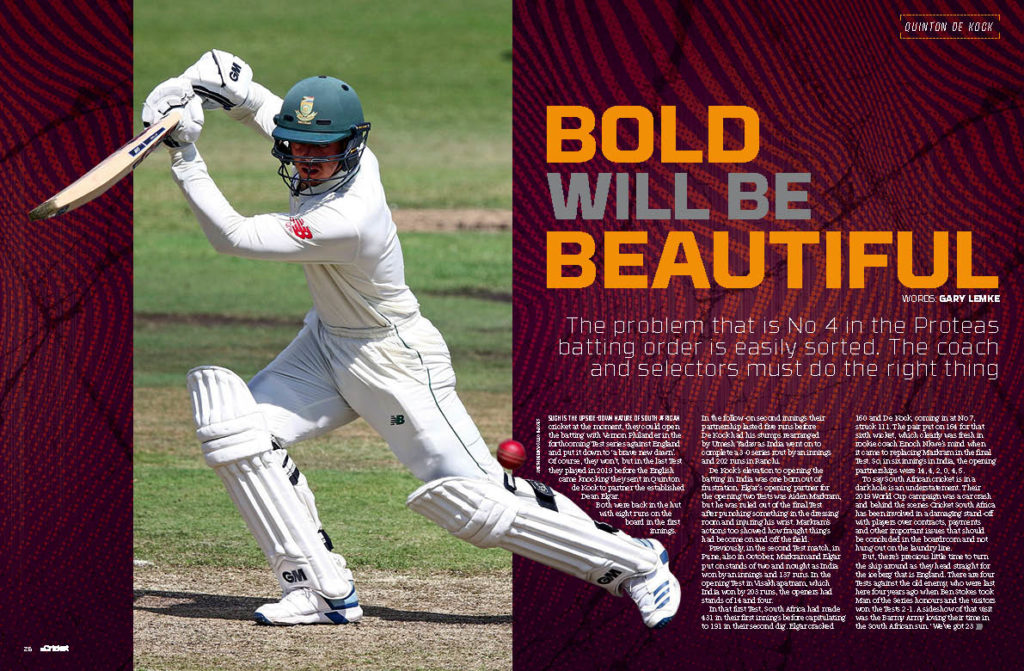The problem that is No 4 in the Proteas batting order is easily sorted. The coach and selectors must do the right thing, writes GARY LEMKE.
Such is the upside-down nature of South African cricket at the moment, they could open the batting with Vernon Philander in the forthcoming Test series against England and put it down to ‘a brave new dawn’.
Of course, they won’t, but in the last Test they played in 2019 before the English came knocking they sent in Quinton de Kock to partner the established Dean Elgar.
Both were back in the hut with eight runs on the board in the first innings. In the follow-on second innings their partnership lasted five runs before De Kock had his stumps rearranged by Umesh Yadav as India went on to complete a 3-0 series rout by an innings and 202 runs in Ranchi.
De Kock’s elevation to opening the batting in India was one born out of frustration. Elgar’s opening partner for the opening two Tests was Aiden Markram, but he was ruled out of the final Test after punching something in the dressing room and injuring his wrist. Markram’s actions too showed how fraught things
had become on and off the field.
Previously, in the second Test match, in Pune, also in October, Markram and Elgar put on stands of two and nought as India won by an innings and 137 runs. In the opening Test in Visakhapatnam, which India won by 203 runs, the openers had stands of 14 and four.
In that first Test, South Africa had made 431 in their first innings before capitulating to 191 in their second dig. Elgar cracked 160 and De Kock, coming in at No 7, struck 111. The pair put on 164 for that sixth wicket, which clearly was fresh in rookie coach Enoch Nkwe’s mind when it came to replacing Markram in the final Test. So, in six innings in India, the opening partnerships were 14, 4, 2, 0, 4, 5.
To say South African cricket is in a dark hole is an understatement. Their 2019 World Cup campaign was a car crash and behind the scenes Cricket South Africa has been involved in a damaging stand-off with players over contracts, payments and other important issues that should be concluded in the boardroom and not hung out on the laundry line.
But, there’s precious little time to turn the ship around as they head straight for the iceberg that is England. There are four Tests against the old enemy, who were last here four years ago when Ben Stokes took Man of the Series honours and the visitors won the Tests 2-1. A sideshow of that visit was the Barmy Army loving their time in the South African sun. ‘We’ve got 23 rand to the pound, we’ve got 23 rand to the pound,’ they roared to the tune of ‘He’s got the whole world in his hands’. Not too much has changed in that regard either.
So, what does a desperate South Africa do to prevent the summer from becoming a cricketing embarrassment, making it seem a long time ago that there were street parades to celebrate the Springboks winning the Rugby World Cup. Well, desperate times call for desperate measures and in a cricketing sense things have never been more desperate for South Africa.
In doing so, coach Nkwe and captain Faf du Plessis must revert to basics. And in a cricketing sense they need to look at their batting lineup, which has been hit hard in recent years by the retirements of Graeme Smith and Jacques Kallis and then more recently by AB de Villiers and Hashim Amla.
It doesn’t matter what team you are, when you take out great players like those, you are going to be in trouble. SAS Proteas has been taking in water by the gallon and is listing badly. Smith made 9 265 Test runs, Kallis 13 289, De Villiers 8 765 and Amla 9 282. That was a combined 40 601 Test runs, including 122 Test hundreds, at the top of the order.
In 2019 South Africa played seven Tests, losing their last five in a row – and Amla featured in the first four of
the year before retiring at the end of the World Cup. In those seven Tests the selectors tried, largely unsuccessfully, to plug the No 4 hole in the batting order. They tried Temba Bavuma (six innings),
Faf du Plessis (four innings), Theunis de Bruyn (three innings) and even Dane Piedt (one innings as a nightwatchman).
But the solution is staring them in the face: pick Quinton de Kock at No 4. He is the most naturally gifted batsman in the country, is now a mature 27-year-old with 43 Tests under his belt and it’s time to stop comparing him to Australia’s Adam Gilchrist who used to bat at No 7 in a dominant side.
De Kock would be a natural No 7 if the top order contained the likes of Smith, Amla, De Villiers and Kallis. On the occasions he’d be required to come in at the fall of the fifth wicket he’d smash tired bowlers to all parts of the ground, against the second new ball. It would be cricketing carnage. But, South Africa doesn’t have that luxury any more. Which is why he needs to go up the order.
Not all the way to opening, as was the makeshift experiment in India, but to No 4. That’s where all the giants bat. Sure, given the brittle nature of the South African batting lineup he’s more likely to come in at 25-2 than at 100-2, but the Proteas need to start somewhere with De Kock. His biggest problem is that he is so good it’s difficult to give him one specific role. Such an accomplished wicketkeeper has he become, with 168 catches and 11 stumpings in Test cricket, and such a key part of the ‘brains trust’ behind the stumps, feeding information to bowler and captain, providing key advice when it comes to using the DRS reviews, that a greenhorn coach such as Nkwe might be afraid to make the big calls.
However, with England arriving, tails in the air after winning the World Cup, engaging in a thrilling Ashes series against Australia and then winging their way to South Africa via New Zealand, Nkwe has to be bold.
That means taking the wicketkeeping gloves off De Kock – you can’t expect him to spend hours at the crease compiling big scores and then a day behind the stumps concentrating on every ball – and give him the keys to the treasured No 4 batting spot. Build the team’s batting around him. Give him the responsibility to go big before he goes home. Make De Kock one of the faces of the Proteas squad.
Political influences might want to tell the world that this team is built around Rabada, Lungi Ngidi and Bavuma, and those politicians will point to Siya Kolisi as an example of what a black sportsman can do in terms of growing the game.
All of which is true, but Bavuma is not the answer to No 4. His scores in that position have been 46, 12, 31, 71, 7, 2, 47, 3, 0, 6, 0, 8; hardly the stuff that will make opposition teams quake in their boots when they see the little man stride to the crease with two wickets down. No 4s need a presence when they come to the middle and South Africa’s great previous No 4s include Graeme Pollock and Kallis.
In the current set-up De Kock is the man with the presence. He has a gift in being able to pick up length from the first ball and he’s not afraid to take on the bowling. He’s also up for the fight – just ask David Warner – and behind the naughty-schoolboy look there’s a competitive fire that rages. Even his own teammates have felt the brunt of his anger. Ask Rabada.
One man who has spent time with De Kock at the crease in all formats of the game is the now retired JP Duminy. ‘Every now and then he gets this look on his face that lets us know he’s in the zone. It’s hard to describe. It’s calm but also full of energy,’ he says.
England bowler Liam Plunkett has also seen De Kock up close and personal. ‘He picks up length at a ridiculous speed,’ Plunkett told the Cricket Monthly. ‘He hits the ball so hard for a guy who isn’t so big, but he also has very delicate hands and plays that late-cut shot very well. He doesn’t need much width to cut so as a bowler you want to hit the top of his middle stump. But if you get the length wrong he whips you over mid-wicket. He’s got to be one of the most challenging guys to bowl to in international cricket.’
According to Paddy Upton, De Kock’s coach at IPL side Delhi Daredevils, assistant Rahul Dravid (13 288 runs in 164 Tests for India) told him, ‘What we were witnessing is the act of a genius. He said that we, as South Africans, did not appreciate just how good this guy was. I had goosebumps when Rahul told me this. It was an incredible moment.’
Over the years it has been said that De Kock doesn’t overcomplicate things, which is one of his strengths. Those who have ‘heard from a friend who heard from a friend who had a beer with one of his teammates’, will say the 27-year-old doesn’t get into philosophical conversations and he’s not someone you’ll find with his head buried in a book in the dressing room.
‘There is more to life than just cricket. My wife encouraged me to open an Instagram account so I could let people know I was out there. But I mostly follow pages about nature.’
His big loves are spending time in the bush and fishing, which are two very different activities lest you get drawn into the narrative that follows De Kock. ‘Facing a Mitchell Johnson bouncer is tame by comparison to tiger fishing,’ he told the Cricket Monthly. ‘Pulling in one of those monsters is the greatest adrenaline rush you can experience.’
It is well documented that he didn’t finish his schooling, being offered a professional contract at the age of 17 before he’d matriculated from KES in Johannesburg, but he has no regrets. Haters will hate. ‘Of course I’m aware of it,’ De Kock said. ‘But it doesn’t bother me any more. People can say what they like but I’m living my best life. If you’re the kind of person who feels brave insulting a stranger from behind a keyboard, that says more about you than it does me.’
Now that the South African sun is out, the guns are going to come out too. And there is no bigger gun in the Proteas batting lineup than De Kock.
The coach and selectors need to be brave. The player doesn’t care where he bats in the order. He just wants to do his best. ‘My goal has never been to retire with a high average or be recognised on the rankings list. My goal is to be an impact player. I want to hit the ball hard and win games and tournaments for my country.’
South Africa must start now. Take the gloves off him, hand them to Kyle Verreynne and let De Kock loose at No 4. In fact, they should have done it a year ago. Whether the new brains trust has the gumption to take the leap remains to be seen and if they don’t it will only highlight the lack of confidence and belief that exists in South African cricket right now.







